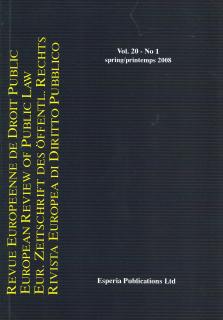
LA SÉCURITÉ EUROPÉENNE: BELGIQUE
(EUROPEAN SECURITY: BELGIUM)
HENRI-D. BOSLY
Professeur ordinaire à l'Université de Louvain (U.C.L.), doyen honoraire de la Fa¬culté de droit, assesseur au Conseil d'Etat
STÉPHANIE BOSLY
Attaché au Service public fédéral Justice (D.G. Législation, Libertés et Droits fon¬da¬mentaux)
The first part examines the main problems raised by the issues regarding the Community's and Union's competence in security matters and in particular the controversy concerning the competence of the European Court of Justice as well as the con¬tent of the regulation, the different legal instruments applied and also the external dimension of the matter. The second chapter concerns the implementation in Belgium of measures adopted in the European level regarding the cross-border ob-servation and hot pursuit, the structures of inter-regional cooperation, the exchange of information between services, the terrorism financing, Europol and Eurojust, and the transposition of the framework decision relating to the European Arrest Warrant. The paper also deals with the impact on the national case law of the control realised on that matter by the European Court of Justice as well as the implementation of the ne bis in idem principle. The final question touches on the balance to be found between the European action in matters of security and protection of fundamental rights (in particular regarding personal data and the fight against terrorism).
La première partie analyse les principaux problèmes suscités par la problématique de la compétence de la Communauté et l'Union en matière de sécurité et notamment les controverses sur la compétence de la Cour européenne de Justice ainsi que sur le contenu de la réglementation, les différents instruments juridiques utilisés ainsi que la dimension externe de la matière. Le deuxième chapitre concerne la mise en œuvre au niveau belge des mesures adoptées au niveau européen quant à l'observation et la poursuite transfrontalières, aux structures de la coopération inter-régionale, à l'échange d'informations entre services, au financement du terrorisme, à Europol et Eurojust, et à la transposition de la décision-cadre relative au mandat d'arrêt européen. L'étude porte aussi sur l'impact sur la jurisprudence nationale du contrôle effectué en cette matière par la Cour européenne de Justice ainsi que l'application du principe ne bis in idem. La dernière question évoque l'équilibre à trouver entre l'action européenne en matière de sécurité et la protection des droits fondamentaux (notamment à propos des données personnelles et de la lutte contre le terrorisme).





















